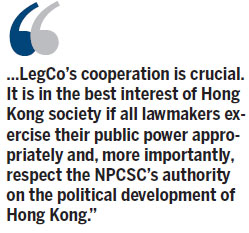Lawmakers must shoulder constitutional responsibilities
Updated: 2014-08-28 07:12
By Bob Lee(HK Edition)
|
|||||||||

Hong Kong, which has long been embroiled in fiery debates over political reform, is unusually quiet at present. This is because the city is waiting for the National People's Congress Standing Committee's (NPCSC) decisive framework which will allow the SAR to elect its next leader in 2017. The country's top legislature has been holding week-long deliberations in Beijing.
The fact that an unprecedented number of Hong Kong delegates were invited speaks volumes about the central government's sincerity and commitment to implement universal suffrage in Hong Kong. Based on our long-term observations, only two or three Hong Kong delegates are typically asked to participate in NPCSC discussions when issues regarding Hong Kong arise. But this time, up to a dozen local representatives are observing discussions. Universal suffrage was not spelt out in the Sino-British Joint Declaration. It was Beijing's idea to put it in the Basic Law. The white paper recently released by the State Council reaffirmed its strong commitment to "one man, one vote" in Hong Kong. Therefore, some pundits' biased accusations that Beijing has reneged on its promise are groundless.
Having said that, Beijing has never allowed for, let alone promised, that anyone could lead the city. Article 45 of the Basic Law unmistakably stipulates that selection of the Chief Executive (CE) should be "by universal suffrage upon nomination by a broadly representative Nomination Committee (NC) in accordance with democratic procedures".
This simple clause implies at least three underlying principles: First, there can be no alternatives which might bypass or undercut the committee's exclusive authority for nomination. The risk of political confrontation can therefore be minimized. Second, the NC's strict scrutiny of the process could minimize the chance of an aspiring CE getting elected, but failing to gain the endorsement of the central government. Third, counting on the NC's majority rule and collective decisions on who is deemed fit to run for the top job, Hong Kong stands a better chance of avoiding falling into the trap of populism - which is rarely a good thing. Jose Manuel Barroso, president of the European Commission, not long ago noted: "In times of crisis that extremist forces, populist forces, have better grounds to oversimplify things and to manipulate feelings - feelings of fear". His words should serve as a timely reminder to our fellow citizens.
The crux of the NCPSC's ongoing debate will be the nomination threshold. Because national security is a top priority it could be expected that CE candidates need to secure support from at least half of the NC before they can stand for election by public ballot. After all, universal suffrage is about far more than purely electoral arrangements, but is closely related to Hong Kong's long-term prosperity and stability, as well as the nation's security and sovereignty. Failure to comply with the Basic Law and the principle of patriots governing Hong Kong could plunge the city into crisis of governance.
Li Fei, deputy secretary-general of NPCSC, reaffirmed that most "pan-democrats" are patriots - which means Beijing has no desire to weed them out. But it will do whatever is necessary to stop troublemakers and spoilers. These people operate under the guise of democracy and in tandem with foreign forces. Their sole intention is to derail Hong Kong from its democratic path.
Foreign meddling is not paranoia - as suggested by the opposition. Since the handover, there have always been a handful of people uncomfortable with the central government's right to govern Hong Kong. They are courting foreign support to turn this city into a politically independent entity. A case in point was recent media revelations of Jimmy Lai's huge donations to the opposition. It has been reported that Lai maintains close links with US politicians. Seven of his family members are British passport holders.
Under these constitutional arrangements, the Legislative Council, along with the CE and NPCSC, are responsible for revising the method of electing the CE. In order to accomplish and implement the revision, therefore, LegCo's cooperation is crucial. It is in the best interest of Hong Kong society if all lawmakers exercise their public power appropriately and, more importantly, respect the NPCSC's authority on the political development of Hong Kong.
It is hoped that Hong Kong's lawmakers, as well as all sectors across the political spectrum in the SAR, shoulder their constitutional and historical responsibilities. They need to show courage and wisdom and set aside their political differences. They should join hands with the central and the SAR governments to embrace universal suffrage.
The author is a senior editor of China Daily Hong Kong Edition. Contact the writer at boblee@chinadailyhk.com
(HK Edition 08/28/2014 page9)